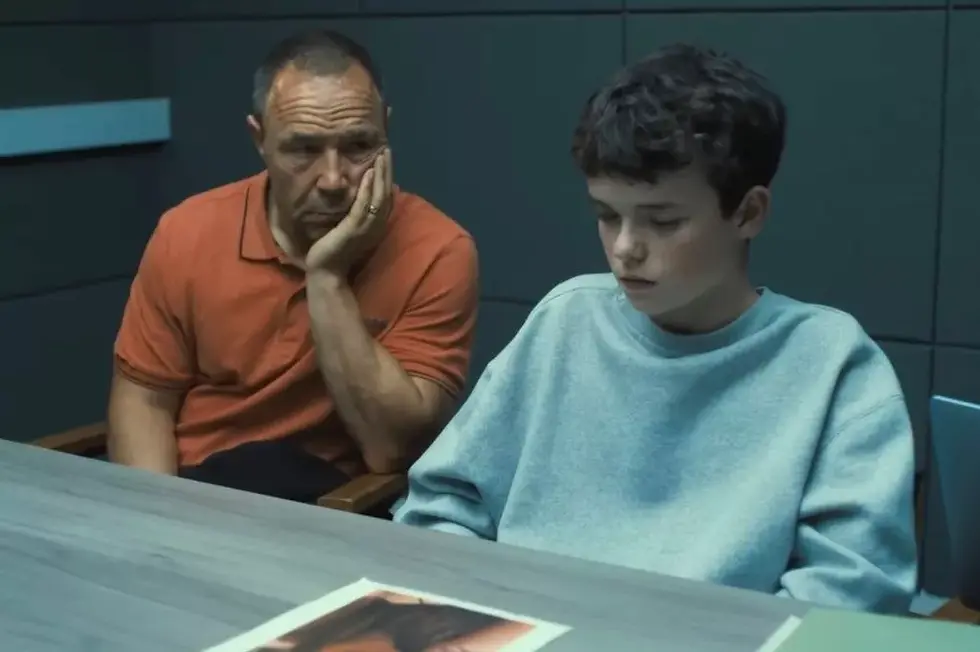
Joe Turner
19 Mar 2025
Blimey reviews Adolescence, Netflix’s latest drama that delivers an emotional punch.
If you're a parent of a school-age boy, I’m torn between urging you to watch Adolescence immediately and cautioning you to steer clear. On one hand, it's undeniably brilliant, and I want you to dive right into it. On the other hand, the series is so raw and grounded in the harsh reality of today's society that it’s as emotionally devastating as it is outstanding.
Set in Yorkshire, Adolescence follows 13-year-old Jamie, who is arrested on suspicion of murdering a young girl at his school. The girl was tragically stabbed the night before, and the drama begins with a morning raid as police storm their home. His parents, Eddie (played by Steven Graham) and his mother (played by Christine Tremarco), follow Jamie to the police station. "Do you believe me that I haven’t done anything?" Jamie asks. "Of course, I believe you. You're my son," Eddie responds.
This isn’t your typical crime thriller, nor is it simply an attempt to raise awareness about knife crime. Instead, Adolescence is a deeply personal exploration of the pressures young boys face today in the UK—particularly around social media and societal expectations of masculinity. Bullying has evolved in the 21st century, with online harassment becoming just as brutal as anything that happens in the schoolyard, often unnoticed by parents caught up in their daily routines.
The format of the show is unconventional, with each of its four episodes shot in a single continuous take. While this “one-shot” approach can occasionally feel overbearing, it heightens the tension in quieter, more intimate scenes. However, the story wouldn’t have suffered if it had been filmed in a more traditional way.
One thing that won’t divide opinions is the acting. The British ensemble’s performances are absolutely breathtaking, with Steven Graham delivering another stellar turn—he doesn’t even need to speak to convey more emotion than most actors can in entire scenes. The real revelation, however, is Owen Cooper, who makes his acting debut in Adolescence. At just 14 years old when filming began, Cooper navigates his role with incredible depth, effortlessly moving between vulnerability, anger, fear, bravado, and devastation. His performance is far beyond his years.
As Eddie reflects, “I still see that little boy—gormless, swinging on the monkey bars, drawing pictures of monsters.” And thanks to Jack Thorne’s sharp script and Cooper’s remarkable portrayal, so do we.
Adolescence defies expectations in more ways than one. While Netflix is typically not associated with the kind of social realism that has defined British public service broadcasters, this show demonstrates that the platform can be a powerful vehicle for thought-provoking, culturally significant drama.
Written by Thorne, who has previously given us gems like Toxic Town, Adolescence is a testament to what happens when creative forces come together to tackle challenging societal issues. The way the show moves through its scenes—like a ballet, fluid and intricate, one moment a corner turned, the next a shot in the car—shows the incredible craftsmanship behind it.
To pull off a drama of this quality, from the writing to the performances and direction, is no small feat, and Adolescence succeeds on every level. Harrowing and beautifully performed, it reminds us of the immense talent this country has to offer and what can happen when people truly collaborate.
The partnership between director Philip Barantini, who previously worked with Steven Graham on Boiling Point, and Thorne has clearly evolved over the years. The intense, one-shot format of both dramas speaks to their shared vision for high-stakes, emotional storytelling, and Barantini's work here shows a much broader range than before.
Graham, as always, brings a generosity to his performance, filling the story with raw, authentic emotions that pull you in. The actor, who initially brought the idea to Thorne, knows how to make space for others to shine, and the performances across the board are stunning.
At its core, Adolescence explores the complexities of teen masculinity and the destructive forces of toxic masculinity, creating a show that is both technically brilliant and emotionally resonant.
This is a drama that will spark opinions, discussions, and debates—much like Mr Bates vs The Post Office before it. When a show taps into institutional and political failure, it transcends mere entertainment and becomes part of the national conversation. And that’s precisely what Adolescence achieves, bringing an urgent issue to the forefront in a way that politics often fails to do.
In a time when British television is so adept at pushing important societal issues into the spotlight, Adolescence stands as a shining example of what homegrown drama can accomplish. With talented figures like Thorne, Barantinii, and Graham at the helm, the British TV ecosystem has never been in a healthier place.
These are creatives who come from public service broadcaster backgrounds, and Adolescence feels undeniably British—grounded in local issues while offering universal themes. It’s no surprise that it's topped the charts in America, proving that great television speaks to audiences worldwide. This show encapsulates the power of drama to inspire change, provoke thought, and, ultimately, transform society.